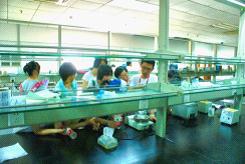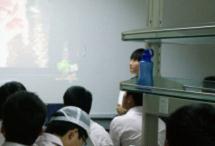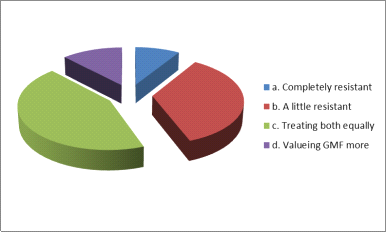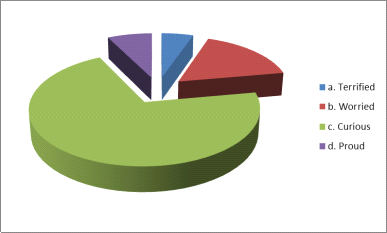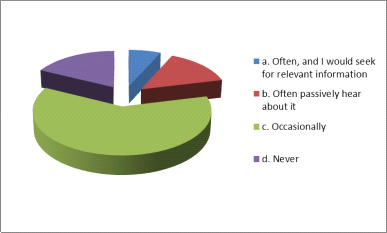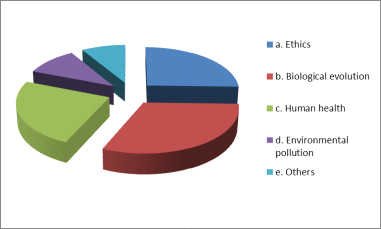Team:USTC-China/Human practice/Activities
From 2011.igem.org
| (6 intermediate revisions not shown) | |||
| Line 2: | Line 2: | ||
{{Team:USTC-China/temp1}} | {{Team:USTC-China/temp1}} | ||
{{Team:USTC-China/temp2}} | {{Team:USTC-China/temp2}} | ||
| - | <h1> | + | <h1>Activities</h1> |
| + | ==Open Day== | ||
| + | <p>From May. 14 to May. 15, we have conducted the visiting activity in our lab as part of the “Open Day of Biox ” program. It is an important component of the Week of Science of USTC, which is an annual event aimed at promoting the spread of science and an unusual chance for the public to get to know what science really is. During these days many of our school’s labs will be accessible for people from the outside to enter and volunteers majoring in these fields will be there as instructors. This year more than 4000 people visited our institute in two days.</p>[[File:USTCopen1.jpg|right]] | ||
| + | <p>What we have done is of much significance in that not only college students but also people at work and the elderly were involved in our activity. Considering in our city nowadays it is not often that a person whose profession is not science can get to know this much about a novel field, our work has contributed a lot to the development of this study outside the campus.</p> | ||
| + | <p>Aware of the potential chance for us to make synthetic biology known by more people, we decided to make our lab part of this activity. After two weeks’ discussion and preparation, we have reached a detailed plan. The whole process consists of videos& explanations, forums& lectures, introductions of equipments, games& interactions and survey. Each section stands for different goals and all of them turned out to be truly effective.</p> [[File:USTCopen2.jpg|right]] | ||
| + | <p>We have used two movies made by teams of iGEM 2010 to provide the audience a vivid image of synthetic biology. A documentary video focusing on the life of our iGEM 2010 team members was also played in order to make this competition known by more. Every day we held two lectures concretely introducing what synthetic biology really is to make our citizens aware of the connection between our research and their daily life. On condition that no one would get injured, we arranged for several team members to explain the characters and usages of our equipments such as the PCR instrument and the centrifuge. We also showed them how to use some of the instruments in a simplified way. For primary school students and kids we designed a game for them. Paper DNA models were used to make it easier to understand the basic structure of DNA. They were also encouraged to make a model themselves. For visitors beyond the age of 12 questionnaires about the public awareness of synthetic biology and concerns about everyday life and ethics were prepared for them to answer according to their own thoughts.</p> | ||
| - | + | ==Survey== | |
| - | <p> | + | <p>During the Science and Technology Week of China we have conducted a survey concerning the acceptance and public awareness of synthetic biology in our city. All of the citizens that visited our lab have contributed to helping us complete this activity, so the sample was expanded to people aged from 12 to 45, which is much bigger than last year. To make the results more convincing and meaningful, we have made introductions about this field and iGEM in advance. The content of the survey goes as follows.</p> |
| - | + | ||
| - | + | ||
| + | <p>1. Your attitude towards genetically engineered food (GMF) is:</p> | ||
| + | a. Completely resistant though its price would be very low;<br/> | ||
| + | b. A little resistant but you will accept it on condition that the advantage in cost is distinctive;<br/> | ||
| + | c. Treating both GMF and normal food equally;<br/> | ||
| + | d. Valueing GMF more than the normal.<br/> | ||
| - | <p> | + | <p>The result can be seen in the following diagram:</p> |
| + | [[File:Ustcsurvey1.png]] | ||
| - | < | + | <p>2. What is your initial response when face with gene manipulation?</p> |
| + | a. Terrified; <br/> | ||
| + | b. Worried; <br/> | ||
| + | c. Curious; <br/> | ||
| + | d. Proud.<br/> | ||
| - | <p> | + | <p>Result:</p> |
| + | [[File:Ustcsurvey2.png]] | ||
| - | <p> | + | <p>From the above we can reach the conclusion that most people in our city hold a positive view towards gene manipulation, which is encouraging because due to our work in iGEM 2010 most students in our school more than a half of the students resist genetically modified food and are terrified when hearing that something is genetically modified.</p> |
| - | + | ||
| - | + | ||
| - | <p> | + | <p>3. Do you often hear about gene manipulation this year?</p> |
| + | a. Often, and I would seek for relevant information;<br/> | ||
| + | b. Often passively hear about it;<br/> | ||
| + | c. Occasionally;<br/> | ||
| + | d. Never.<br/> | ||
| - | <p> | + | <p>Result:</p> |
| + | [[File:Ustcsurvey3.png]] | ||
| + | <p>From the diagram we can tell that in contrast with the wide awareness of students in our school, general citizens are obviously more ignorant about gene manipulation. It is a warning bell for us researchers because it is them that consist most of the society.</p> | ||
| - | < | + | <p>4. What aspect do you think will be largely struck by gene manipulation?</p> |
| - | <a | + | a. Ethics;<br/>b. Biological evolution;<br/>c. Human health;<br/>d. Environmental pollution;<br/>e. Others<br/> |
| - | </ | + | |
| + | <p>Result:</p> | ||
| + | [[File:Ustcsurvey4.png]] | ||
| + | <p>It shows that most people think biological evolution, ethics and human health will be largely impacted, which is also our concern.</p> | ||
| + | |||
| + | <p>5. Will you consider the influence of your work that may affect the future society (environment, ethics, health, etc.) when doing scientific research? (For students only)</p> | ||
| + | a. I will, and I will adjust my working process according to it;<br/> | ||
| + | b. I will consider part of it, but not if it may affect the result of my research;<br/> | ||
| + | c. Not at all.<br/> | ||
| + | |||
| + | <p>Result:</p> | ||
| + | [[File:Ustcsurvey5.png]] | ||
| + | <p>This question shows a fact that most of our future generation is responsible for the environment and the whole human beings when doing scientific research. We can draw the conclusion that there is much hope for our future as long as advanced technologies are used properly.</p> | ||
| + | |||
| + | <h3>Conclusion</h3> | ||
| + | <p>From the data above we can summarize that most of our citizens are able to get to get to know synthetic biology as a brand new scientific approach. It is clear that no matter how the world changes what we need is always an environment that can function well in spite of the uneasiness caused by various technical progresses. Since we have discovered that most people are not that against gene manipulation, it is not that hard to make the whole society believe that we are doing the same thing.</p> | ||
Latest revision as of 01:54, 29 October 2011

Contents |
Activities
Open Day
From May. 14 to May. 15, we have conducted the visiting activity in our lab as part of the “Open Day of Biox ” program. It is an important component of the Week of Science of USTC, which is an annual event aimed at promoting the spread of science and an unusual chance for the public to get to know what science really is. During these days many of our school’s labs will be accessible for people from the outside to enter and volunteers majoring in these fields will be there as instructors. This year more than 4000 people visited our institute in two days.
What we have done is of much significance in that not only college students but also people at work and the elderly were involved in our activity. Considering in our city nowadays it is not often that a person whose profession is not science can get to know this much about a novel field, our work has contributed a lot to the development of this study outside the campus.
Aware of the potential chance for us to make synthetic biology known by more people, we decided to make our lab part of this activity. After two weeks’ discussion and preparation, we have reached a detailed plan. The whole process consists of videos& explanations, forums& lectures, introductions of equipments, games& interactions and survey. Each section stands for different goals and all of them turned out to be truly effective.
We have used two movies made by teams of iGEM 2010 to provide the audience a vivid image of synthetic biology. A documentary video focusing on the life of our iGEM 2010 team members was also played in order to make this competition known by more. Every day we held two lectures concretely introducing what synthetic biology really is to make our citizens aware of the connection between our research and their daily life. On condition that no one would get injured, we arranged for several team members to explain the characters and usages of our equipments such as the PCR instrument and the centrifuge. We also showed them how to use some of the instruments in a simplified way. For primary school students and kids we designed a game for them. Paper DNA models were used to make it easier to understand the basic structure of DNA. They were also encouraged to make a model themselves. For visitors beyond the age of 12 questionnaires about the public awareness of synthetic biology and concerns about everyday life and ethics were prepared for them to answer according to their own thoughts.
Survey
During the Science and Technology Week of China we have conducted a survey concerning the acceptance and public awareness of synthetic biology in our city. All of the citizens that visited our lab have contributed to helping us complete this activity, so the sample was expanded to people aged from 12 to 45, which is much bigger than last year. To make the results more convincing and meaningful, we have made introductions about this field and iGEM in advance. The content of the survey goes as follows.
1. Your attitude towards genetically engineered food (GMF) is:
a. Completely resistant though its price would be very low;
b. A little resistant but you will accept it on condition that the advantage in cost is distinctive;
c. Treating both GMF and normal food equally;
d. Valueing GMF more than the normal.
The result can be seen in the following diagram:
2. What is your initial response when face with gene manipulation?
a. Terrified;
b. Worried;
c. Curious;
d. Proud.
Result:
From the above we can reach the conclusion that most people in our city hold a positive view towards gene manipulation, which is encouraging because due to our work in iGEM 2010 most students in our school more than a half of the students resist genetically modified food and are terrified when hearing that something is genetically modified.
3. Do you often hear about gene manipulation this year?
a. Often, and I would seek for relevant information;
b. Often passively hear about it;
c. Occasionally;
d. Never.
Result:
From the diagram we can tell that in contrast with the wide awareness of students in our school, general citizens are obviously more ignorant about gene manipulation. It is a warning bell for us researchers because it is them that consist most of the society.
4. What aspect do you think will be largely struck by gene manipulation?
a. Ethics;
b. Biological evolution;
c. Human health;
d. Environmental pollution;
e. Others
Result:
It shows that most people think biological evolution, ethics and human health will be largely impacted, which is also our concern.
5. Will you consider the influence of your work that may affect the future society (environment, ethics, health, etc.) when doing scientific research? (For students only)
a. I will, and I will adjust my working process according to it;
b. I will consider part of it, but not if it may affect the result of my research;
c. Not at all.
Result:
This question shows a fact that most of our future generation is responsible for the environment and the whole human beings when doing scientific research. We can draw the conclusion that there is much hope for our future as long as advanced technologies are used properly.
Conclusion
From the data above we can summarize that most of our citizens are able to get to get to know synthetic biology as a brand new scientific approach. It is clear that no matter how the world changes what we need is always an environment that can function well in spite of the uneasiness caused by various technical progresses. Since we have discovered that most people are not that against gene manipulation, it is not that hard to make the whole society believe that we are doing the same thing.
 "
"
